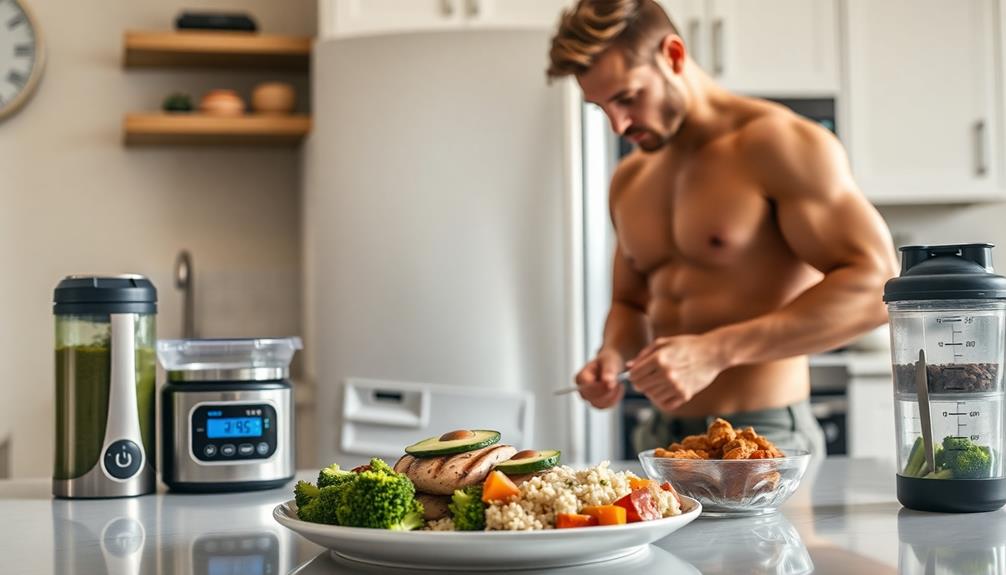If you're looking to pack on muscle without the unwanted fat, you've come to the right place. Clean bulking is an art that requires careful planning and the right nutritional approach. You might be wondering how to strike that perfect balance between calorie surplus and lean gains. Fortunately, we've compiled a list of the four best clean bulking food plans that can help you achieve your muscle-building goals without compromising your physique. These plans offer a variety of options, from quick and easy recipes to more elaborate meal prep strategies. But before we explore the specifics, let's consider what makes these plans stand out from the rest.
The Ultimate Bodybuilding Cookbook
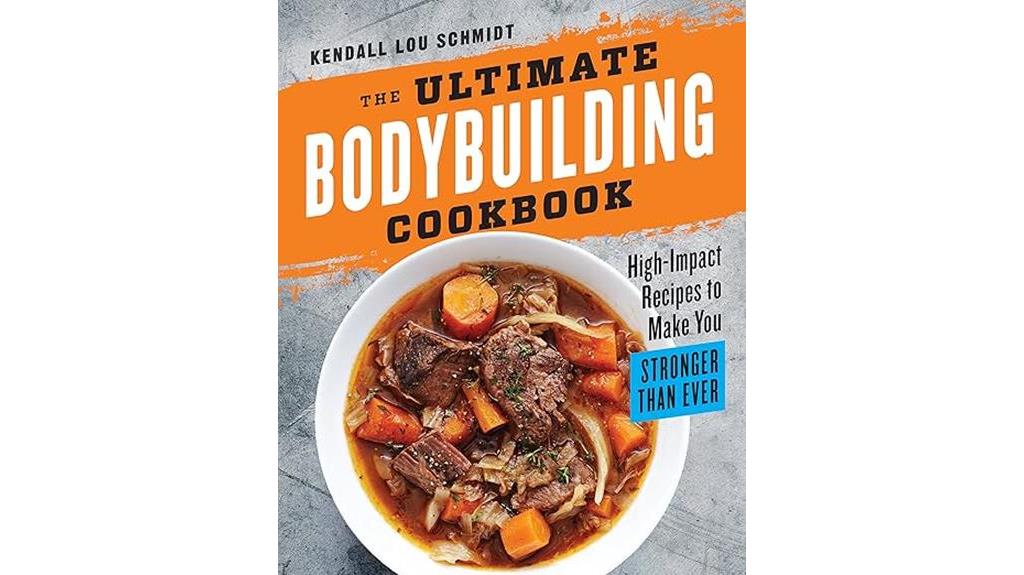
If you're looking for a complete guide to muscle-building nutrition, The Ultimate Bodybuilding Cookbook is an excellent choice. This book is packed with easy-to-follow recipes that are budget-friendly, with many meals costing less than $5 per serving. It starts with a simple introduction to nutrition, helping you figure out your caloric and protein needs based on your fitness goals.
Whether you're new to cooking or a seasoned chef, you'll enjoy the variety of dishes that go beyond the usual chicken and rice. Try out recipes like orange chai chicken or slow cooker beef stew. These meals are designed to keep your taste buds satisfied while supporting your muscle growth. The book also includes helpful meal prep tips and recipes for protein bars, giving you everything you need to fuel your fitness journey effectively.
Best For: Fitness fans and bodybuilders looking for a wide range of easy, affordable, and nutritious recipes to help them build muscle.
Pros:
- A diverse selection of simple, budget-friendly recipes for all cooking levels
- Detailed nutritional information and guidance for calculating your specific needs
- Meal prep tips and protein bar recipes for quick and convenient options
Cons:
- Some recipes may be too sweet, especially those with high amounts of stevia
- Nutritional information might not always match what users log based on their ingredients
- The lack of visual examples for calorie and protein calculations could be confusing for some users
The Bodybuilders Kitchen: Muscle-Building and Fat Burning Recipes
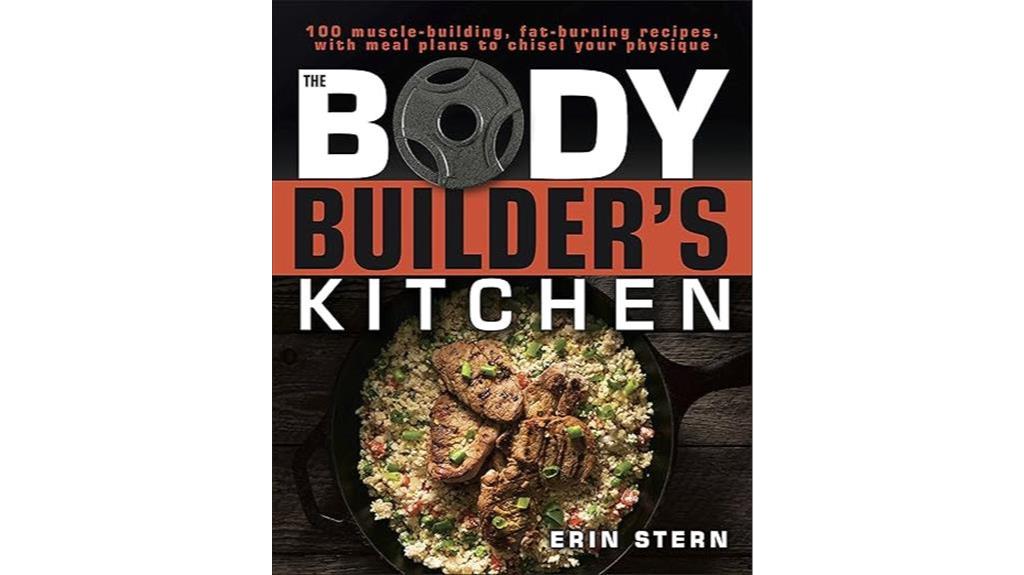
Bodybuilders and fitness enthusiasts looking for a guide to clean eating will love "The Bodybuilders Kitchen." This cookbook features 100 muscle-building and fat-burning recipes that cater to different dietary needs, whether you're cutting or bulking. Each meal contains between 160 to 300 calories per serving and packs in 20-35 grams of protein, making it simple to meet your macro goals.
The recipes are easy to follow and use accessible ingredients like protein whey powder and liquid aminos. You'll find budget-friendly options and simple ingredient lists, perfect for busy home cooks. Many users have praised the meals for being tasty, well-seasoned, and suitable for the whole family. The cookbook also provides useful information on calorie breakdowns, ingredient alternatives, and carb timing strategies, making it a great resource for anyone new to healthy eating.
Best For: Bodybuilders, fitness enthusiasts, and anyone wanting to build muscle, burn fat, or follow a clean eating plan with easy-to-make, macro-friendly recipes.
Pros:
- 100 diverse recipes for various dietary needs (cutting, bulking, Keto-friendly).
- Simple, quick recipes that use accessible ingredients.
- Helpful nutritional information, calorie breakdowns, and carb timing guidance.
Cons:
- Some users noted differences between the shopping list and ingredients needed for recipes.
- Certain ingredients, like protein whey powder, may not be available to everyone.
- The calorie range (160-300 calories per serving) might not fit all fitness goals or body types.
The Shredded Chef: 120 Recipes for Building Muscle and Staying Healthy
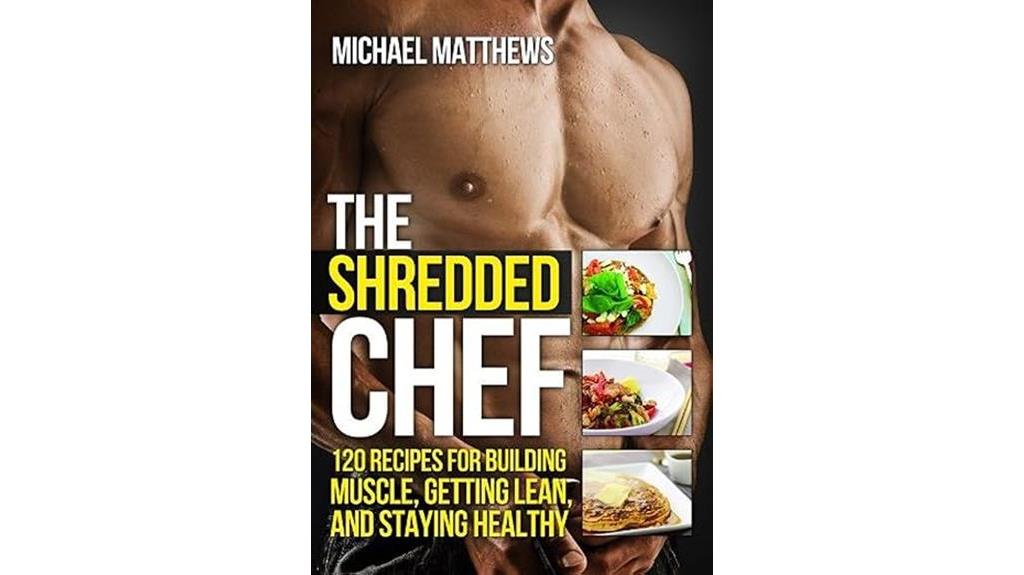
Athletes who want to improve their diet for building muscle and losing fat will find "The Shredded Chef" to be a great help. This cookbook by Mike Matthews includes 120 simple recipes designed to support muscle growth and overall health. You'll discover a range of meals, from chicken and beef to pasta, sides, and even desserts, all organized for either getting lean or bulking up.
One of the best parts of the book is the clear nutritional information provided. Each recipe comes with calorie counts and details on macronutrients, making it easy to monitor what you eat. You'll also find short descriptions, ingredient lists, and estimated prep times for each dish. Most recipes serve 2-4 people, so you can plan your meals for the week without hassle. Matthews shares tips on marinating meat and making homemade dressings to boost flavor. Whether you're an experienced bodybuilder or just starting out, "The Shredded Chef" delivers practical and tasty recipes for clean bulking and gaining lean muscle.
Best For: Athletes and fitness lovers looking for easy, healthy recipes to achieve muscle gain and fat loss goals.
Pros:
- Each recipe features detailed nutritional information, including calorie counts and macronutrient details.
- A diverse selection of 120 easy-to-make recipes, organized for lean or bulking diets.
- Practical tips for meal preparation, marinating, and enhancing flavors.
Cons:
- May not accommodate specific dietary needs or preferences (like vegetarian, vegan, or gluten-free).
- Recipes are typically for 2-4 portions, which may not fit all household sizes.
- Some users might find the focus on muscle-building recipes a bit narrow for general healthy eating.
The Shredded Chef: 125 Recipes for Muscle Building and Health
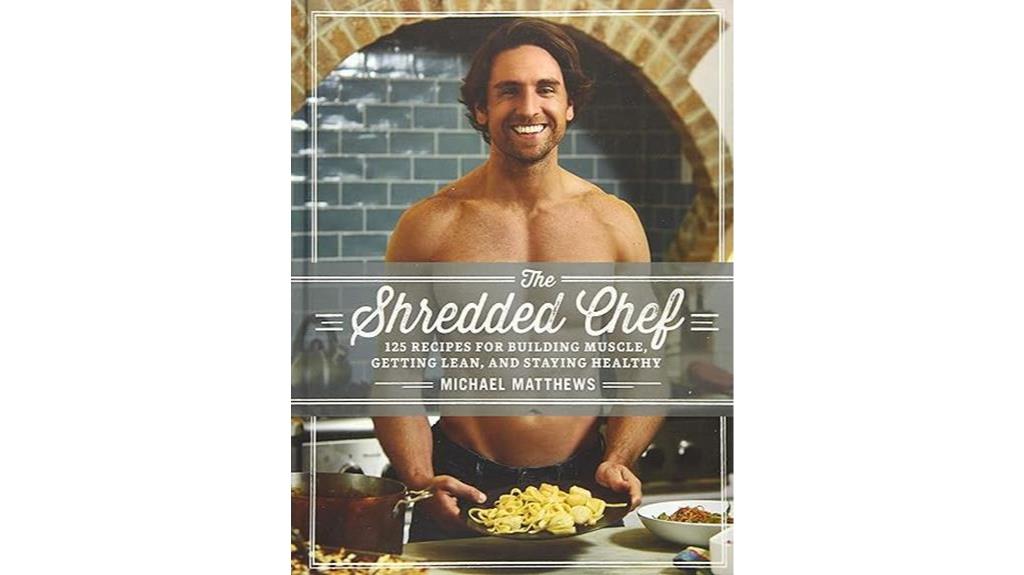
Packed with 125 muscle-building recipes, "The Shredded Chef" is perfect for fitness enthusiasts who want to enjoy healthy cooking while working towards their clean bulking goals. You'll discover a variety of dishes, from smoothies to main meals, all crafted to support your fitness journey. The book focuses on simplicity and flavor, so you don't have to sacrifice taste for health.
Try the Creamy Blueberry-Banana Smoothie for a quick pre-workout boost, or enjoy the Beef Stroganoff for a protein-rich dinner. Don't overlook the Pollo Fajitas, known for their delicious marinade. Each recipe comes with nutritional information, making it easy to track your macros. While some readers may wish for more meal plans, you'll find valuable cooking tips and ingredient substitutions. It's like having a personal chef and nutritionist in one cookbook!
Best For: Fitness enthusiasts and bodybuilders looking to enhance their cooking skills while sticking to a healthy, muscle-building diet.
Pros:
- Features 125 tasty recipes specifically designed for muscle building and overall health
- Nutritional information for each recipe helps with macro tracking
- Includes useful cooking tips and ingredient substitutions for flexibility
Cons:
- Does not include specific meal plans for various fitness goals
- Some recipes may not have detailed cooking instructions
- Limited photographs to accompany the recipes
Factors to Consider When Choosing Clean Bulking Food Plans
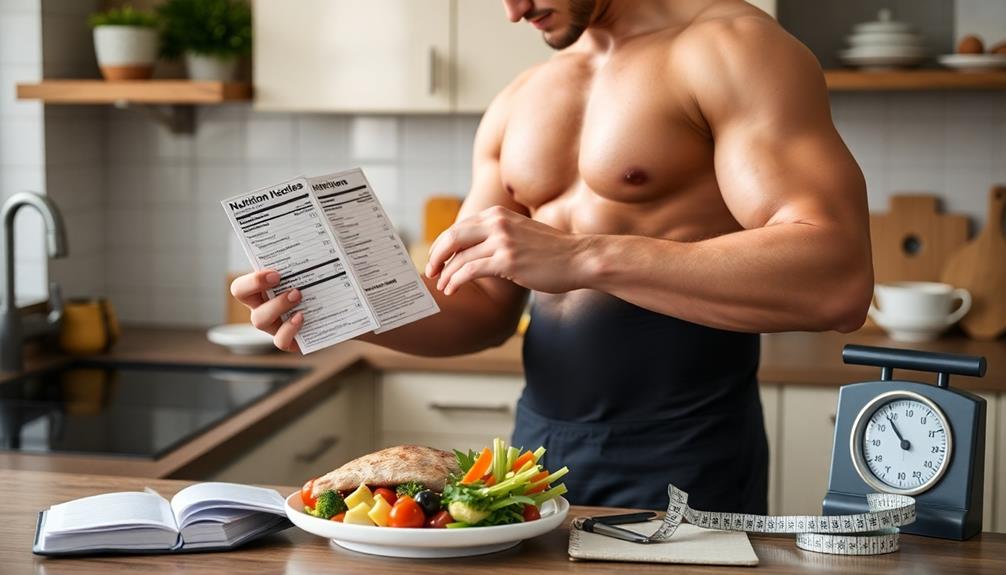
When you're selecting a clean bulking food plan, you'll need to take into account several key factors to guarantee success. You'll want to focus on nutritional balance and variety, understand your calorie surplus requirements, and optimize your macronutrient ratios. It's also essential to plan your meal timing and frequency, while paying close attention to food quality and sources to support your muscle-building goals.
Nutritional Balance and Variety
When planning a clean bulking food plan, focus on three main factors: nutritional balance, variety, and portion control. Make sure your meals include the right mix of macronutrients. A good guideline is to aim for 40-60% carbohydrates, 25-35% protein, and 15-30% fats. This balance helps you build muscle while keeping fat gain to a minimum.
Variety is also important for both nutrition and enjoyment. Include a range of whole foods in your diet, such as:
- Lean proteins (like chicken, fish, and lean beef)
- Complex carbohydrates (such as brown rice, quinoa, and sweet potatoes)
- Fruits and vegetables (including berries, leafy greens, and broccoli)
- Healthy fats (like avocados, nuts, and seeds)
These foods provide necessary vitamins and minerals that support your overall health and muscle recovery. It's also helpful to time your carb intake around your workouts. This helps replenish glycogen and aids in muscle repair.
Calorie Surplus Requirements
To effectively create a clean bulking food plan, you need to calculate your calorie surplus. This means consuming 250 to 500 calories more than your body needs to maintain its current weight. This approach allows you to gain about 0.5 to 1 pound per week, which is ideal for building muscle without gaining extra fat.
Here's how to find your calorie surplus:
- Figure out how many calories you need to maintain your weight.
- Add 250 to 500 calories to that number.
- Check your weight each week.
- Make adjustments to stay within the 0.5 to 1 pound gain range.
Keep in mind that it's not only about the calories you consume; the balance of macronutrients also matters. Aim for:
- 40-50% of your calories from carbohydrates
- 25-35% from protein
- 20-30% from healthy fats
This balance will give you the energy you need for workouts, help with muscle growth, and keep you feeling full. When planning your meals, focus on whole, nutrient-dense foods. They provide the essential vitamins and minerals your body needs to function well and build lean muscle. Think of your body as a high-performance engine; it requires the right fuel to operate effectively.
Macronutrient Ratios Optimization
Optimizing macronutrient ratios is key to creating an effective clean bulking food plan. Focus on balancing protein, carbohydrates, and fats to support muscle growth while keeping fat gain to a minimum. Aim for 25-35% of your calories from protein, 45-60% from carbs, and 15-30% from healthy fats.
To determine your protein needs, use your body weight as a guide. A good range is 1.2 to 2.2 grams of protein per kilogram of body weight. This helps ensure your muscles receive the necessary building blocks for growth.
Timing is important as well. Eating carbs and protein before and after workouts can improve muscle repair and growth. Think of it as fueling your muscles before the game and helping them recover afterward.
Variety is essential in your diet. Include a wide range of whole, nutrient-dense foods to meet your macronutrient goals while also getting essential vitamins and minerals. Picture your plate as a colorful puzzle, where each food item adds to your overall gains.
Lastly, be ready to make adjustments. Your body's needs may change as you progress, so regularly check and tweak your macros to keep up with your goals!
Meal Timing and Frequency
Rhythm is key to your clean bulking journey, especially when it comes to when and how often you eat. To boost muscle growth and recovery, you should plan your meals smartly. Here's how to make the most of your meal timing and frequency:
- Protein Timing: Try to eat protein every 3-4 hours. This keeps a steady flow of amino acids in your body, which supports muscle growth.
- Smaller Meals: Instead of having just three big meals, aim for 5-6 smaller meals throughout the day. This can help keep your hunger in check, maintain your energy, and ensure you're getting enough nutrients.
- Pre- and Post-Workout Food: Don't skip meals before and after your workouts. Eating carbohydrates and protein around your training times can improve your performance and help you recover better.
- Post-Workout Meal: Within 30-60 minutes after exercising, have a balanced meal with protein, carbs, and healthy fats. This is crucial for recovery and muscle building.
Food Quality and Sources
Now that you've got your meal timing sorted, let's talk about what you should put on your plate. The quality and source of your food are crucial for successful clean bulking. Here are some key points to keep in mind:
- Focus on whole, nutrient-rich foods:
- Lean proteins: Think chicken, fish, lean beef, and eggs.
- Complex carbs: Choose brown rice, sweet potatoes, and oats.
- Healthy fats: Include avocados, nuts, and olive oil.
- Fruits and vegetables: Aim for a variety to get different nutrients.
- Select high-quality protein sources:
- Don't overlook plant-based options like legumes and quinoa; they're great for everyone, not just vegetarians!
- Choose complex carbohydrates:
- These will give you lasting energy and important fiber. Your digestive system will appreciate it.
- Add healthy fats:
- They help with hormone production and provide extra calories. Just remember to use them in moderation!
- Opt for organic when you can:
- This helps reduce your intake of pesticides and additives. Remember, your body is a temple, not a chemical store.
Dietary Restrictions Consideration
Creating a clean bulking food plan that considers dietary restrictions is important for your health and effectiveness. Here are some simple tips to help you tailor your diet based on your needs.
If you have food allergies, like nuts, gluten, or dairy, find safe alternatives that offer similar nutrition. For instance, if nuts are off-limits, try seeds or avocados for healthy fats and protein.
For vegetarians and vegans, focus on plant-based proteins. Good options include legumes, quinoa, and plant-based protein powders to support muscle growth.
If you're following a ketogenic or low-carb diet, choose high-fat foods while keeping your carb intake low.
For those with diabetes, select foods that help keep blood sugar stable. Low glycemic index carbs and high-fiber foods can support your clean bulking goals without affecting your health negatively.
If you're lactose intolerant, look for lactose-free dairy options or non-dairy sources of calcium and protein. Fortified plant milks and tofu are great choices to ensure you get the nutrients you need.
Budget and Ingredient Accessibility
Creating a clean bulking food plan that fits your budget is important for building muscle without overspending. Aim for recipes that cost less than $5 per serving. These affordable meals make it easier to stick to your clean bulking goals over time.
To simplify meal prep and keep costs down, choose recipes with few, easy-to-find ingredients. This way, you can prepare healthy meals quickly without searching for hard-to-find items. Many clean bulking cookbooks highlight common pantry staples and protein sources, like whey protein and liquid aminos, which makes shopping easier and cheaper.
Here are some tips for budget-friendly clean bulking:
- Use meal prep strategies to stretch your grocery budget.
- Plan your carb intake around your workouts to support your fitness goals.
- Modify recipes to fit your dietary needs while keeping costs in mind.
- Choose versatile and affordable ingredients.
Frequently Asked Questions
How Long Should a Clean Bulking Phase Last?
You should typically aim for a clean bulking phase lasting 3-6 months. It's long enough to see significant muscle gains but short enough to avoid excessive fat accumulation. Adjust based on your progress and goals.
Can I Drink Alcohol While on a Clean Bulking Diet?
You should limit alcohol while clean bulking. It's high in empty calories, disrupts protein synthesis, and can hinder muscle growth. If you do drink, opt for occasional light consumption and prioritize your nutrition and workout goals.
Should I Adjust My Macronutrient Ratios During Clean Bulking?
Yes, you should adjust your macros during clean bulking. You'll want to increase your calorie intake, focusing on protein and complex carbs. Aim for a slight surplus to support muscle growth without excessive fat gain.
Are There Any Supplements Essential for Clean Bulking Success?
While supplements aren't essential, you'll benefit from a quality protein powder and creatine monohydrate. They'll support muscle growth and recovery. Multivitamins can fill nutritional gaps, but focus on whole foods first for your clean bulking success.
How Much Weight Gain per Week Is Ideal During Clean Bulking?
You should aim for a gradual weight gain of 0.25 to 0.5 pounds per week during a clean bulk. This rate allows you to build muscle while minimizing fat gain. It's a sustainable approach that'll yield better long-term results.

